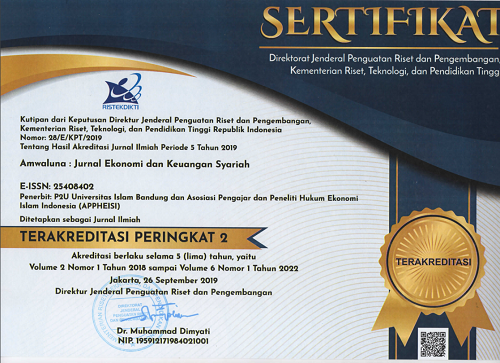Waqf Crowdfunding Model in Post-Pandemic Economic Improvement According to Islamic Sharia and National Law
Abstract
Technological developments make waqf able to be developed in terms of socialization, fundraising, and management in an effort to improve the economy after the COVID-19 pandemic. This study aims to identify and analyze the waqf crowdfunding model for post-pandemic economic improvement according to Islamic law and national law. This research is qualitative with a normative juridical approach, using types and sources of legal data including primary legal sources, Law No. 41 of 2004 concerning Waqf, PP No. 42 of 2006, and other regulations. In terms of Islamic sharia, namely the Al-Quran, Al-hadith, fatwas, and the opinions of related scholars, Secondary legal sources are journals, proceedings, theses, dissertations, and books, while tertiary legal sources are interviews with crowdfunding managers and nadzhir waqf. Then the data is collected through library research and then analyzed to see the synchronization stage and conformity with legal norms and principles through descriptive analysis.
Keywords
Full Text:
PDFReferences
Ahmad Ibn Hanbal. (2008). Musnad Al-Imam Ahmad Ibn Hanbal. Daarul Fikr.
Anas, M. Bin. (1994). Al-Mudawwanah Al-Kubra. Daarul Fikr.
Ascarya. (2017). The real determinants of financial crisis and how to resolve it in Islamic economics perspective. International Journal of Economic Research.
Az-Zuhaili, W. (2011). Fiqhul Islam wa Adillathuhu. Daarul Fikr. Bairut.
Az-Zuhaili, W. (1998). Al-Washâya Wa Al-Waqf Fi Al-Fiqh Al-Islâmi. Daarul Fikr . Bairut.
Badan Pusat Statistik Indonesia. (2021). Kajian Big Data Sinyal Pemulihan Indonesia Dari Pandemi Covid 19. Badan Pusat Statistika.
Diniyah, F. (2021). Faktor yang Mempengaruhi Niat Perilaku Muslim Menggunakan Platform Crowdfunding Waqf: Teori UTAUT Model. Jurnal Ilmiah Ekonomi Islam, 7(2), 544–552.
Foundation, G. C. A. (2021). CAF WORLD GIVING INDEX 2021. Global Charities Aid Foundation. https://www.cafonline.org/about-us/publications/2021-publications/caf-world-giving-index-2021
Hasanah,Uswatun D. R. H. (2020). EMPOWERMENT: CROWDFUNDING SEBAGAI INOVASI WAKAF UANG DENGAN ANALISIS PEMBIAYAAN AL-QARD. EKSYDA, 1(1), 43–56.
Iswi Hariyani & Cita Yustisia Serfiyani. (2015). Perlindungan Hukum Sistem Donation Based Crowdfunding Pada Pendanaan Industri Kreatif Di Indonesia (The Legal Protection Of The Donation-Based Crowdfunding System On The Creative Industry In Indonesia). Jurnal Legislasi Indonesia, 12(4), 355.
M. A. Mohd Thas Thaker, H. Mohd Thas Thaker and A. Allah Pitchay. (2018). Modeling Crowdfunders’ Behavioral Intention to Adopt the Crowdfunding-Waqf Model (CWM) in Malaysia: The Theory of the Technology Acceptance Model. International Journal of Islamic and Middle Eastern Finance and Management, 11(2), 231–249.
Mhafudz, A. A. (2021). Penggunaan Wakaf Uang dengan Platform Crowfunding P2P: Pelopor Perkembangan Filantropi Islam di Indonesia. Deloitte Indonesia Perpectives, 17–21.
Mu’allim, A. (2018). Ijtihad Ekonomi dalam Pengelolaan Aset Wakaf. AL-’ADALAH. https://doi.org/10.24042/adalah.v14i2.2212
Munzir Qahaf. (2006). Al-Waqf Al-Islâmi; Tatawwuruhu, Idâratuhu, Tanmiyyatuhu. Daarul Fikr.
Nasution, A. D., & Medias, F. (2019). Waqf Financing Model Through Crowdfunding Platform: An Indonesian Perspective. 1st Borobudur International Symposium on Humanities, Economics and Social Sciences (BIS-HESS ), 436, 661.
Nor Razinah Mohd Zain Nur Farhah Mahadi Azman Mohd Noor. (2019). HE POTENTIAL IN REVIVING WAQF THROUGH CROWDFUNDING TECHNOLOGY: THE CASE STUDY OF THAILAND. Al-Shajarah ( Journal of Islamic Thought and Civilization), 89–106.
RI, K. A. (2021). Data Tanah Wakaf. http://siwak.kemenag.go.id/
Sukmana, R., Setianto, R. H., Premananto, G. C., & Ajija, S. R. (2020). APPLICATION OF BLOCKCHAIN BASED WAQF CROWDFUNDING IN FISHERMEN GROUP: CASE STUDY OF NAMBANGAN AND CUMPAT, SURABAYA. Darmabakti Cendekia: Journal of Community Service and Engagements, 2, 26–29.
Sulistiani, S. L. (2021). The legal position of Waqf for non-muslims in efforts to increase Waqf assets in Indonesia. Samarah, 5(1), 357–371. https://doi.org/10.22373/sjhk.v5i1.9161
Sulistiani, S. L., Mulyadi, D., & Gumilar, A. S. (2021). Literasi Wakaf Melalui Media Sosial Untuk Meningkatkan Kesadaran Berwakaf Pada Masa Pandemi Covid-19. Jurnal Ilmiah Ekonomi Islam, 7(3), 1551–1560.
Sulistiani, S.L. Yunus, M., & Bayuni, E. M. (2019). Aspek hukum Bank Wakaf Mikro dalam pengentasan kemiskinan berbasis pesantren di Indonesia. Jurnal Bimas Islam. https://doi.org/10.37302/jbi.v12i1.86
Syarjaya, S., Fahruroji. (2017). Wakaf Uang Dalam Perspektif Hukum Islam Dan Peraturan Perundang-Undangan (CIMB Niaga).
Thaker, M. A. B. M. T., & Pitchay, A. A. (2018). Developing waqf land through crowdfunding-waqf model (CWM): the case of Malaysia. Journal of Islamic Accounting and Business Research.
Zahra, A. (2004). Muhadarat fi al-waqf. Al-Fikr Al-’Arabi.
DOI: https://doi.org/10.29313/amwaluna.v7i1.10130
Refbacks
- There are currently no refbacks.
Editorial Office:
Syariah Faculty, Universitas Islam Bandung
Jalan Tamansari No. 24-26 Kota Bandung

Amwaluna : Jurnal Ekonomi dan Keuangan Syariah is licensed under a Creative Commons Attribution-NonCommercial-ShareAlike 4.0 International License.







